MercoPress. South Atlantic News Agency
Antarctica
-
Monday, November 5th 2018 - 18:25 UTC
Microscopic parasite could be affecting food chain near Antarctica

A tiny parasite is leading Australian scientists to rethink how they view Antarctic food chains, after a research showed these microscopic organisms were present in quantities far larger than previously thought, it was reported Monday.
-
Monday, November 5th 2018 - 08:22 UTC
CCAMLR fails to protect Southern Ocean

The Commission for the Conservation of Antarctic Marine Living Resources (CCAMLR) has again failed to take action to protect the Southern Ocean, with no progress made on the critical issues of marine protected areas, climate change, and transshipment.
-
Thursday, November 1st 2018 - 08:18 UTC
IAATO working on new online platform to promote conservation among tourists
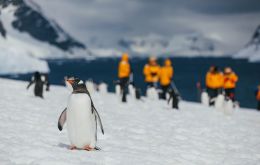
An organization that promotes responsible tourism in Antarctica is embarking on its own digital adventure after partnering with Leeds agency Elementary Digital. The International Association of Antarctica Tour Operators (IAATO) represents more than 100 Antarctic tour operators who are committed to minimizing the impact of travel to this remote and vulnerable region.
-
Wednesday, October 24th 2018 - 08:49 UTC
NASA pictures a rectangular iceberg floating in the Weddell Sea

Nasa has released a striking photo of a rectangular iceberg floating in the Weddell Sea off Antarctica. The US space agency said the object's sharp angles and flat surface suggested it had recently broken away from an ice shelf. The edges are still pointed, and have not yet been worn down by the ocean waves.
-
Wednesday, October 17th 2018 - 07:44 UTC
UK Antarctic Heritage Trust announces a new Port Lockroy team for 2018/19
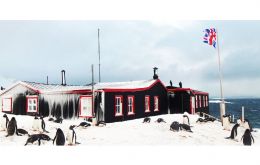
The United Kingdom Antarctic Heritage Trust (UKAHT) is delighted to reveal details of the quintet who will live and work at Port Lockroy on a remote island off the Antarctic Peninsula during the 2018/19 Austral Antarctic summer (November – March).
-
Monday, October 15th 2018 - 08:29 UTC
East Falkland, among most plastic contaminated shores in South Atlantic Islands
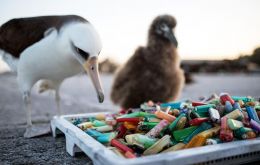
The amount of plastic washing up onto the shores of remote South Atlantic islands is ten times greater than it was a decade ago, according to new research published in the journal Current Biology. Scientists investigating plastics in seas surrounding the remote British Overseas Territories, including East Falkland, discovered they are invading these unique biologically-rich regions. This includes areas that are established or proposed Marine Protected Areas (MPAs).
-
Monday, October 15th 2018 - 08:24 UTC
Preparing Antarctica's Rothera to accommodate the RSS Sir David Attenborough
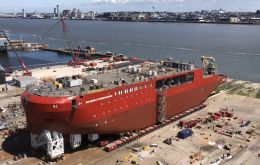
An international team of builders is preparing to ship an entire kit of parts from the UK to create a new wharf in the Antarctic. The work is part of the £100m upgrade of the Rothera research station to accommodate its new vessel, the RSS Sir David Attenborough. Almost 4,000 tons of equipment and materials will be shipped 11,000km next month.
-
Tuesday, September 25th 2018 - 08:24 UTC
Green mosses of East Antarctica are succumbing to climate change, says scientific paper
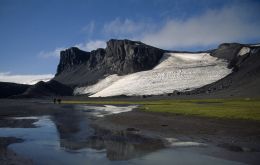
Emerging from the ice for a brief growing season every Antarctic summer, the lush green mosses of East Antarctica are finally succumbing to climate change. That is according to a study of the small, ancient and hardy plants - carried out over more than a decade.
-
Saturday, September 8th 2018 - 09:05 UTC
Award for new map of South Georgia and the “Shackleton Crossing”

British Antarctic Survey’s detailed map of the sub-Antarctic island of South Georgia featuring the epic “Shackleton Crossing” has won an award at the 2018 British Cartography Society Awards.
-
Saturday, September 8th 2018 - 09:01 UTC
Giant iceberg “A68” takes off from Antarctica mainland to the Southern Ocean

A large iceberg in Antarctica has calved off the Larsen C ice shelf as of July last year and budged only a little from the coast until recently. In the past two months, the iceberg, known as 'A68', has taken a drastic 90 degree swing away from the Antarctic mainland and into the Southern Ocean.
